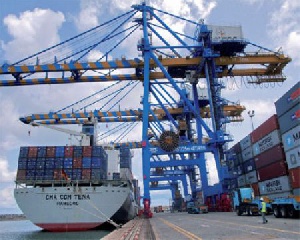The Ghana Shippers Authority together with the Borderless Alliance have held a one-day stakeholder engagement workshop, in Kumasi, with haulage transport operators and other stakeholders in transit trade operations to discuss challenges confronting the transit trade sector.
Prominent among the issues discussed were the effects of implementing the new axle-load regime in Ghana, which became operational on January 1, 2014; and road governance information on checkpoints, illegal payment and delays on the Tema-Ouagadougou road corridor.
However, it was revealed at a forum that chances of the country reaping some revenue from the transit trade operations continue to wane due to non-uniformity in enforcement of the axle-load control regime among member-countries of ECOWAS and the West African Economic and Monetary Union (UEAMOA) in the sub-region.
The axle-load limit, applied in Ghana for some time now, has been different from what is applied in other countries of the sub-region. Ghana is currently noted to be the only country in the sub-region implementing a limit of 60 metric tonnes gross weight for 6-axle trucks. This situation is observed to have given rise to various adverse effects for the country.
According to reports provided at the forum average transport costs shot up by 50%, resulting in the loss of substantial cargo to neighboring countries that were not implementing the regime. This is believed to have among others led to a sharp decrease in transit trade through the ports of Ghana since initial implementation of the axle load policy in 2009.
In the wake of these developments, many truck operators who could not cope with the permitted axle-load limit per the Axle Load Regulations which were being enforced relocated to neighboring countries where the regime is not being strictly applied.
The Ghana Highways Authority (GHA), in charge of enforcing the Axle Load regime, initially pegged the maximum allowable tonnage for six-axle vehicles at 51 metric tonnes (mt). Following a review of the limits at UEMOA level, Ghana now implements an allowable limit of 60 mt, and fines any excess up to 68 mt – with a much higher fine thereafter.
This development has not pleased haulage transport operators, who have called for an upward adjustment of the maximum allowable tonnage of the new Axle Load Regulation under the Road Traffic Regulations of 2012 per LI 2180.
Alhaji Muniru Abdel Rhamani, executive member of the Ghana Haulage Transport Owners Association (GHATOA), said the only way transporters and truck owners can come to terms with the GHA and other implementing bodies on the axle load policy is for government to consider reviewing the permissible tonnage from 60mt to 68mt.
He alleged that implementation of the axle-load limit has brought untold hardship to truck operators in the transit trade business.
Mr. Robin-Huws Barnes, Regional Manager, GSA, said considering the determination of the Authorityto ensure efficiency and competitiveness of the trade and transport industry, it is important to engage stakeholders in identifying ways of surmounting the challenges emanating from implementation of the axle-load limit, and highlight the essentials of the policy.
He said the Authority considers that harmonisation of the axle-load implementation within the sub-region will create the needed environment for economic growth, as it will enhance the free movement of goods and persons within the sub-region as envisioned by ECOWAS Trade protocols.
He believes that the two main regional institutions of ECOWAS and UEMOA will make efforts to ensure that a harmonised axle load regime is implemented within the sub-region.
Business News of Friday, 18 July 2014
Source: B&FT
Challenges in transit trade disturbing – Operators
Entertainment












